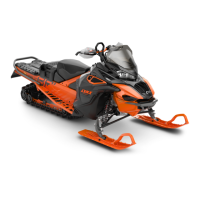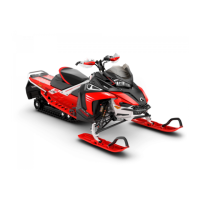Rubber bottom boots with either a ny-
lon or a leather top, with removable
felt liners are best suited for snowmo-
biling.
You should keep yourself as dry as
possible whe n snowmobiling . Wh en
you come indoors, take your snowmo-
bile suit and boots off and make cer-
tain they dry properly.
Do not wear long scarfs and loose ap-
parels that could get caught in moving
parts.
What to Bring
Every snowmobiler should carry at
least the following basic parts and
tools that can help him and others in
an emerge n cy:
• this Operator's Guide
• spare spark plugs and wrench
•frictiontape
• spare drive belt
• spa re starter rope
• spare light bulb s
• tool kit (including at least pliers,
screwdriver, adjustable wrench)
•knife
• flas hlig h t.
Include other items depending on the
length and time of your ride.
Riding P osition
Your riding pos ition and b alance are
the two basic principles of making
your snowmobile go where you want
it to. When turning on the side of a
hill, you a nd your passenger must be
ready to s hift body weight to help it
turn in the desired directio n. Driver
and passenger(s) must never attempt
this maneuvering by placing feet out-
side of the vehicle. Experience will
teach you how much lean to put in-
to turns at different speeds and how
much you will have to lean into a slope
to maintain proper balance.
Generally, the riding position for best
balance and control is sitting. Howev-
er, the posting, kneeling or standing
positions are also used under certain
conditions.
The novice driver should become fa-
miliar with the sn ow mobile through
practice on a level area at slow speeds
before venturing afield.
WARNING
Do not attempt any maneuvers if
they are beyond your abilities.
14
______________________
